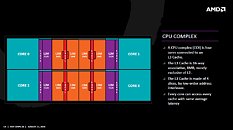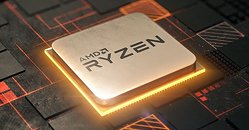Wednesday, July 25th 2018

Rumor: AMD's Zen 2, 7 nm Chips to Feature 10-15% IPC Uplift, Revised 8-core per CCX Design
A post via Chiphell makes some substantial claims on AMD's upcoming Zen 2 microarchitecture, built on the 7 nm process. AMD has definitely won the core-count war once again (albeit with a much more decisive blow to Intel's dominance than with Bulldozer), but the IPC battle has been an uphill one against Intel's slow, but sure, improvement in that area over the years. AMD did say, at the time they introduced the Zen architecture, that they had a solid understanding on Zen's choke points and its improveable bits and pieces - and took it to heart to deliver just that.A 10 to 15% improvement should bring AMD close to Intel's Kaby Lake solutions in pure per-core, single-thread performance - with the possibility for higher performance in multithreaded workloads even at the same clocks and core counts, since AMD's SMT implementation and per-core communication seems to best that of even Intel's Coffee Lake chips. Add to that the sure clock increases AMD will bring to their Zen 2 parts - you can bet the power consumption and top frequency benefits for the 7 nm manufacturing process (some estimated 1.6X logic density, ~20% speed improvement, and ~40% power reduction compared to TSMC's 10 nm process) won't go to waste when they can be used for an even greater performance uplift.Add to that the possibility -also posted via the Chiphell thread) of a per-CCX core-count increase of 8 cores per CCX (with 16-core parts being available for the consumer products) and a purely hypothetical claim for the performance crown now seems not only plausible, but likely.
Sources:
Chiphell, TSMC


108 Comments on Rumor: AMD's Zen 2, 7 nm Chips to Feature 10-15% IPC Uplift, Revised 8-core per CCX Design
- Intel K CPUs are not supplied with stock coolers at all, and we know why: its pointless
- Since Kaby Lake Intel is just providing its CPUs with factory OC's. There is a reason the TDP jumped up to 95W and they go way beyond that if you so much as look at the BIOS.
- Intel relies heavily on binning, another aspect AMD has them beat from a design/yield perspective.
What I mentioned is the hardware support for instructions like AVX. AVX is an instruction set that can allow for 256 bit wide hardware registers or 2x 128 bit ones. AMD chose the latter , therefore instructions such as AVX are carried out at half the throughput that Skylake can do. In practice it's never really half , the gap is much smaller but it's there.
wccftech.com/intel-xeon-scalable-family-roadmap-revealed-points-out-cascade-lake-sp-in-q4-2018-cooper-lake-sp-in-q4-2019-ice-lake-sp-in-1h-2020/
I really can't decide how much I want Intel to be skullcrushed. I want them to really learn their lesson so they never let themselves stagnate like this again, but at the same time it looks like they might be in almost as bad a position as AMD was by 2021 - and I do not want AMD to simply become the new dominating force without competition. At this point it looks like AMD may have 7nm+ out before Intel launches any 10nm product...
Who knows, maybe Intel will become so desperate they actually launch Graphene 1nm chips in 2025 or something...
Just FYI, even though L3 cache is shared, it's still tied to a core. This means L3 cache may only benefit other cores if two or more cores accesses the same data within a very short timespan, it's not like one core can "borrow" the L3 from another.
But yes, it will be a nice product.And Skylake-X/-SP can do 2× 512-bit FMA.FMA3 is an extension to AVX introduced by AMD(!). It performs operations like a × b + c in a single operation, which speeds up many types of calculations like matrix multiplication. But it saves more than you might immediately think, since the single operation saves a whole cycle through the pipeline.
Unfortunately, even though RAM with 3600+ speed is available and has been for quite some time, Ryzen has been unable to take advantage of this and you'll be hard pressed to find Ryzen systems working with RAM @ speeds 3600+. They exist (i've seen 4000 myself), but they are very uncommon because tinkering with the sub-timings is required in order to get it to work: something you usually don't need in an Intel system because you're normally able to have the rated XMP speeds simply by selecting them in the BIOS.
This is an incredible point people are missing: If you care about Price/Perf (at any resolution), Ryzen 2 is the obviously better choice. If you care about just having the highest performance possible, then you should ALSO choose Ryzen with fast memory.
The tweaking required to get Ryzen to optimal performance is still too much for most people. So Intel's winning because it offers almost the same but in a much easier way, and often cheaper even on its most expensive mainstream CPUs. Fiddling with timings is advanced user niche territory. An OC on Intel is really not - as much, at least.
2. If you read what I said, anyone getting an 8700K doesn't care about Price/perf (if they did, they wouldn't even glance at Intel). So the "Extra cost ruins the value" BS is really not true for these people.
3. In terms of Enthusiast Price/Perf, you are still wrong. Ryzen is cheaper AND better performing. Here are 2 different ram kits:
www.newegg.com/Product/Product.aspx?Item=N82E16820313771&cm_re=DDR4-_-20-313-771-_-Product
www.newegg.com/Product/Product.aspx?Item=N82E16820313618&cm_re=DDR4-_-20-313-618-_-Product
It only costs $70 to go from 2400 to 3733 memory! That's less than the price difference required to buy the 8700K (+$50), the AIO Liquid Cooler (+$75), and the more expensive Intel motherboard (+$25). You are actually saving a lot of money (and energy usage) by going with the 2700X + Fast RAM instead of the 8700K + Peasant RAM. Also, it is going to beat the 8700K system at gaming and allow upgrades to 7nm Zen next year.
Sure: 2700X catches up to Intel (and passes, on some instances) when overclocked with RAM using good timings in gaming but, as soon as you overclock the 8700K, it's game over, simply because the 8700K overclocks allot more, and even further if you end up de-lidding. I think it's more "common" to find 8700K running @ 5.2 GHz then it is to find a 2700X @ 4.4 GHz and that clock speed difference is simply too massive atm for AMD.
You'll need to spend some cash to achieve a good OC on 2700X, both on RAM and in cooling, which can be as low as you said but can also be quite significantly higher, depending on where you live. The same is true for the 8700K but you're forgetting that those that buy the 8700K also tend to pair it with good RAM which, although doesn't give a gain as big as it does in a Ryzen system, still gives it. This will ofc make the 8700K system even more expensive but also even better performer.
Heck in that benchmark they used ram slower than I found for cheap!
If you "pull all the stops" to make the Ryzen faster, it will surpass the 8700K but, if you do the same to the 8700K, it pulls even further ahead and that's the problem here because, and unless you have bad luck with the 8700K (silicon lottery), it will overclock past the 2700X every single time.
This WILL change when AMD increases the IPC but that depends on how much it increases and even then, it could still lose to Intel, depending on how much it OCs (or doesn't).
Unfortunately for your point you missed the point. Intel is still releasing 10nm Icelake S for mainstream next fall. You're article is only Server/Work Station are not getting 10nm in 2019.
So all Intel fans don't have to worry about 10nm next year for Dual channel launch.
I Reilly hope Zen 2 IPC is big improvement and get a little better closer to Intel IPC performance and trying harder and harder to get all around better performance!
It only makes, Intel do something otherwise they sit back and milk it.
Intel is 100 times bigger than AMD so if if there wasn't a law in place of buying out your compilation in place, Intel would throw pocket change at AMD.... Done
So Zen 2 vs Icelake next year going to be amazing.
EDIT
Look @ the following, and pay attention to only the graphs with RAM @ 3200 MHz:
As you can see, there's quite a difference between them, with just messing on the timings. Only the blue one to the right has a different CL timing but all the others have CL14.
And come on, everyone with a brain knows it's like a 66%+ chance that it slips to 2020.
Quit acting like you've found the holy grail or something. The landscape hasn't changed - Intel is the top option for high refresh rate gaming - cost and performance wise with the 8600K and 8700K respectively. For everything else, Ryzen 2 is the go-to option. And that's still quite a feat.